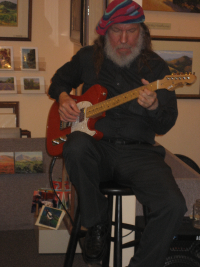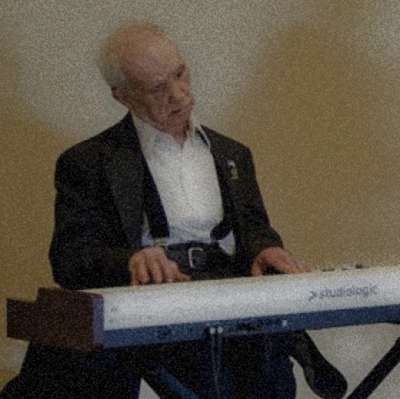.
.
“Old Man Hands,” a story by Terry Sanville, was a short-listed entry in our recently concluded 58th Short Fiction Contest, and is published with the consent of the author.
.
.
___
.
.
CC0 public domain/via PxHere

.
.
Old Man Hands
by Terry Sanville
.
…..Gordon sat in the corner of the Red Sky Café and stared at his fingers as they slid across the fretboard of his Fender Stratocaster. They seemed disconnected from the rest of his body but hardwired to his brain. When he thought blue, they moved to his favorite notes. When he thought joy, a new series of chords and major scales opened up. He thought, played, listened, and watched.
…..One moment everything stopped and he rested, the tune’s melody left far behind. Background noise intruded. He looked up. Thirty tables of tourists and locals ate their dinners: the clatter of flatware against plates, the blast of a child’s voice, the rumble of conversation. A few patrons slowly clapped their hands and one or two gazed at nothing. Typical. Gordon reached for his wine glass and emptied it.
…..“Can I buy you another?” A pretty middle-aged woman stood before him and dropped bills into his oversized brandy snifter tip jar. She shifted from foot to foot, seemed to be nervous, unsure of how to act. Maybe she too has thoughts like my thoughts. There are always a few.
…..“The house red is just fine, miss,” he answered, “and thank you.”
…..The woman went to the bar and ordered then returned to her table and her grinning husband. He probably had dared her to get up in front of that crowd and display appreciation. Gordon didn’t care why. He stared at the list of tunes he’d memorized and played for years, trying to pick ones that covered a range of tastes. Not everyone liked blues, jazz standards, and old rock and roll. A few country and folk tunes, a little Spanish flamenco, and maybe a classical piece should do it.
…..As he studied his list, he noticed his hands: the fingernails thick and yellowed, the backs spotted and wrinkled, purple blotches where the thin aged skin failed to cushion life’s blows. The fingers on his left hand looked slightly twisted, probably from pushing and pulling on steel guitar strings for nearly sixty years.
…..The wine arrived. Gordon took a sip and played Maha de Carnaval. But his thoughts had left the building and drifted back to the 1960s and the beginning of it all.
.
***
.
…..“I love your hands,” Joan said and kissed Gordon on the ear.
…..“My hands? Really?”
…..“Yes, when you play guitar it’s like magic. They’re so . . . so . . . I don’t know . . .”
…..Gordon grinned. “Thanks. Now I’ve got one more thing to be self conscious about.”
…..The couple sat on the edge of her parent’s swimming pool, their bare legs swishing the water, and watched the sun disappear over Monterey Bay and the white-capped Pacific beyond. They had come from an afternoon at The Frog, a coffee house where poets spouted free verse and folk singers sang protest songs, shared lyrics, and showed each other new moves on the guitar.
…..Gordon turned slowly and kissed Joan on the mouth.
…..“Just don’t stop playing and you’ll do fine,” she murmured.
…..“Yeah, I’m the life of the party.” He nuzzled her neck and inhaled her perfume. Do girls ever really see me when I’m playing and singing? Or am I just one more false image that changes into someone else that they daydream about?
.
***
.
…..Gordon smiled to himself and took another sip of wine. He’d been so insecure as a twenty-year-old, ashamed of his gnomish features and even of his hands. And fifty-five years before, at least his voice had been presentable. Now, he only sang in the shower and on special occasions—like someone’s favorite song at his or her funeral.
…..The restaurant manager approached. “Hey Gord, you’re soundin’ great, man. But you need to start playing again . . . and go easy on the red.”
…..“Sure, Sal, sure. Memories are just getting in the way.”
…..Sal grinned. “Can’t have that, man. At your age we’d be here all night.” Sal chuckled, pantomimed strumming a guitar, then turned and wandered throughout the dinning room, stopping to chat with customers.
…..Gordon wondered why he continued to play for his supper and tips at two-bit joints that paid squat. After all, he’d performed with symphony orchestras and big jazz bands, read down complicated charts, and stood up to do solos using his unorthodox fingerpicking style.
…..His lower back throbbed and his wrists ached. Gritting his teeth, Gordon reached inside his sport coat and found the pill bottle. He downed a Norco with a sip of red and pressed the button on his electronic tuner. The Stratocaster’s new strings had continued to stretch in the heat and he struggled to nudge the forty-year-old electric guitar back in tune.
…..Yes, why am I still doing this? These hands have played for decades. But not everyone was happy with them.
.
***
.
…..“Ouch. Watch it!”
…..“What?”
…..“Your hands. Can’t you do something about that?”
…..“I could wear gloves.”
…..“Don’t be a smart ass. I’m serious.”
…..Gordon and his new wife, Marcie, lay in bed on a hot afternoon, naked, aroused, and in Marcie’s case, frustrated. Foreplay was not going well. Outside their hotel room, thunder boomed and lightening hissed and crackled in the Kansas City heat.
…..“Your hands are gross,” Marcie complained. “Those callouses on your left are too scratchy . . . and the fingernails on the right can carve wood. I’m not made of wood. Use something else.”
…..“I thought you didn’t like . . .”
…..Marcie giggled. “Oh, just shut up and come here.”
…..Gordon and Marcie had married just after he graduated from Cal with a degree in music. They toured the country for several years with various bands before Gordon fell into a studio gig in Hollywood that paid the mortgage, gas and food. But at least three nights a week he played at clubs around LA. Marcie came to every performance, helped him haul his equipment, tune his guitars, and let him know when he played too loud or too soft.
…..“You sounded way too loud that last set,” she said one night at the Whisky on Sunset. “You need to get your hearing checked.”
…..“Yeah, yeah. I know. But the music business is loud.”
…..“If you lose your hearing you’ll be finished.”
…..Marcie had scored a nursing job in Long Beach and Gordon trusted her medical advice. The audiologist told him he needed to quit the club scene or permanently damage his hearing.
…..They lived a comfortable yet Spartan life for almost thirty years until Marcie got cancer just before the great recession of 2008. She died soon after. Gordon sold their tiny house in Culver City, applied for Social Security, and moved to the Central California Coast. He bought a trailer in an old mobile home park and began his last chapter gigs, following the West Coast’s version of The Chitlin’ Circuit.
…..The arthritis that started in his forties had finally reached his hands. Before every gig he took a pain pill and afterward soaked them in a hot Epsom salt bath, the pain never going away.
…..Damned old man hands.
,
***
.
…..The restaurant’s meager crowd thinned out when the town’s movie theaters opened for their evening shows. A great weariness hung on Gordon’s shoulders and he asked for a cup of coffee to give himself a boost. He played Gershwin’s Summertime, slow and easy following MJQ’s arrangement while adding his own twists.
…..Patrons at a half dozen tables lingered over dessert. One of the tables included two junior high school boys and a girl about the same age. They stared at his hands as he played then whispered to each other. The girl scribbled in a tiny spiral-bound notebook. Their two sets of parents fingered empty wine glasses and stared into space.
…..Gordon took one more break before finishing up. He studied his list, selecting the last six tunes, always ending with One for My Baby, Frank Sinatra’s version. He’d be home in time to watch PBS’s Friday night movie and let the heating pad calm his back muscles.
…..“Excuse us.”
…..The trio of young teens stood before him, the tall boy with braces doing the talking. They all clutched greenbacks and grinned nervously.
…..“We . . . we really like your playing,” the tall boy continued.
…..“Yeah, it’s sweet,” the girl said and laughed nervously.
…..As if on command, they reached forward and dumped their money into the tip jar.
…..“Thanks guys. Appreciate it.”
…..The short boy with a dark birthmark below an ear asked, “So . . . so how old is that Strat?”
…..“I bought it new in 1980, the year they added the hotter pickups.”
…..The trio nodded and shuffled from foot to foot. Finally the girl asked, “What was that chord you started Summertime with . . . ya know, the one way up the neck?”
…..Gordon fingered the chord. “That’s a A-minor-ninth . . . and I play the melody by adding notes on the B-string.”
…..She grinned. “See, I told you guys.”
…..“There was another one at the turnaround that I didn’t get,” the tall boy said.
…..Gordon smiled. “Yeah, most players go to an E-dominant seventh for two measures. But I substitute a B-minor-seventh-flat five followed by an E-seventh-sharped ninth.” He showed them on his guitar.
…..“You guys studying music in school?”
…..The short boy, nodded. “Yeah, we’re all in band, but we’ve formed our own group.”
…..“That’s cool.”
…..“Yeah, except they make me play bass,” the girl complained.
…..“You know, Paul McCartney and Sting both play bass.”
…..The girl smiled. “I’m not sure who they are.”
…..“So did you ever play with anybody famous?” the short boy asked.
…..“Probably not anybody you would know.”
…..“So . . . so how come you play finger-style and don’t use a pick?” the girl asked.
…..“I guess I just started that way, playing folk songs.”
…..“But what happens when you break a fingernail?”
…..“I’m . . . I’m pretty much screwed.”
…..The trio giggled nervously.
…..“How long have you been playing?” the short boy asked.
…..“Almost sixty years.”
…..Their eyes widened. They stayed quiet until the girl murmured, “Do . . . do you still love it?”
…..“Yes.”
…..Finally the tall boy said, “Well, thanks for talking with us. Ah . . . really liked your playing.”
…..“Thanks guys . . . and keep practicing.”
…..The trio ambled back to their table. Gordon sucked in a deep breath and smiled. The dregs of the restaurant crowd had that in-no-hurry-to-leave look. The teens stared at him, trying to memorize every note and chord as his fingers flew over the strings with renewed energy. They crowded one end of a table. The girl scribbled frantically in her notebook while the others tried new fingerings on their air guitars. They seemed excited by the newness of Gordon’s old sounds.
…..Later that night he sat in front of the dark TV, the remote poised. But instead of clicking on the PBS movie, he found a channel that showed a jazz quartet that he’d never heard before playing at the Viper Room on Sunset. After retrieving his guitar, Gordon watched, listened, played, and thought, the sounds burning new channels between his mind and his old man hands.
.
.
___
.
.

Terry Sanville lives in San Luis Obispo, California with his artist-poet wife (his in-house editor) and two plump cats (his in-house critics). He writes full time, producing short stories, essays, and novels. His short stories have been accepted more than 450 times by journals, magazines, and anthologies including The Potomac Review, The Bryant Literary Review, and Shenandoah. He was nominated twice for Pushcart Prizes and once for inclusion in Best of the Net anthology. Terry is a retired urban planner and an accomplished jazz and blues guitarist – who once played with a symphony orchestra backing up jazz legend George Shearing.
.
.
Listen to the 1964 recording of Chet Atkins playing “Summertime”
.
.
Click here to read “Mouth Organ” by Emily Jon Tobias, the winning story in the 58th Jerry Jazz Musician Short Fiction Contest
.
Click here to read “Lydia,” a short story by Allene Nichols
.
Click here for information about the upcoming Jerry Jazz Musician Short Fiction Contest
.
.
.







































